- Two Thanksgiving Thoughts for the ACAPosted 10 years ago
- Shop til you Drop at the Healthcare Marketplace Part 2: Frustration!Posted 10 years ago
- An Early Casualty in the Affordable Care FightPosted 10 years ago
- Some Good News for a ChangePosted 10 years ago
I Took Myself Off the Internet for Eight Days

This picture and the two above were taken in my front yard Oct 2, 2013.
I recently took advantage of my current situation – I live in a cabin in the woods, 90% of the time by myself and next to neighbors who are almost always gone – to enjoy a luxury few people (who aren’t out of touch with current technology) are afforded; I detached myself from the internet, my two desktop computers, my laptop and my smart phone’s non-phone capabilities for eight days. I only used the phone as a phone; to make and receive calls and take and retrieve voice mail messages, and I rarely even did that since I try to get everyone to call my land line instead. I can misplace my smart phone for days without realizing it. Near the end of my unplanned self-induced exile, I told a buddy about my abstinence just like I’m wording it here. Within hours he sent me the first text he sent in weeks. I get it from all directions. The liberation I was already experiencing by moving from a 1-bedroom apartment with no balcony in the Midwest (a two-year purgatory existence as a result of a personal commitment) to a two-level house with a full, finished basement on 2.5 acres in the middle of the woods in the more-beautiful-and-green-by-the-day Hudson Valley became even more enhanced when I detached myself from the internet. It didn’t occur to me until a few days into my abstinence that Netflix streaming on my Blu-Ray player was internet-enabled so I stopped that as well. I was inspired by the new season of “Arrested Development” to re-watch the series from the beginning and it’s hilarious and addicting. That show is turn-on-a-dime quick and the entire cast is completely committed to the bit.
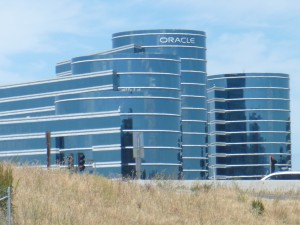 For the first two years of the 1990’s, when I was at a Silicon Valley company that was at the height of the software industry (and when Apple was on a respirator with the vultures hovering), I repeatedly threatened to quit to move to Montana and raise chickens. The implication was that I wanted to leave it all behind and be as remote and live as uncomplicated and self-sufficient a life as possible. Some of my co-workers loved hearing that while others found it mystifying. The people there were exceptionally bright, well-rounded, focused and hard-working and I thrived in the fast pace and enjoyed the insurmountable workload. I like working, so it’s not an issue of work ethic at all. My implied objection was simple; that corporate (or any) offices are unnatural environments, no matter how nice and modern they are and that they have a beautiful view of the company’s lake (it was built where Marine World used to be) and the Redwood City hills. It was around that time it occurred to me that, once I stopped having technology related/dependent commitments, it might be an interesting idea to rid myself of non-essential electronics and live a more primal, uncomplicated existence and get as close to nature as possible. My (or anybody’s) definition of what is non-essential is obviously up for debate and that definition could change from day to day. Today, mine excludes TVs, basic appliances and a computer with an internet
For the first two years of the 1990’s, when I was at a Silicon Valley company that was at the height of the software industry (and when Apple was on a respirator with the vultures hovering), I repeatedly threatened to quit to move to Montana and raise chickens. The implication was that I wanted to leave it all behind and be as remote and live as uncomplicated and self-sufficient a life as possible. Some of my co-workers loved hearing that while others found it mystifying. The people there were exceptionally bright, well-rounded, focused and hard-working and I thrived in the fast pace and enjoyed the insurmountable workload. I like working, so it’s not an issue of work ethic at all. My implied objection was simple; that corporate (or any) offices are unnatural environments, no matter how nice and modern they are and that they have a beautiful view of the company’s lake (it was built where Marine World used to be) and the Redwood City hills. It was around that time it occurred to me that, once I stopped having technology related/dependent commitments, it might be an interesting idea to rid myself of non-essential electronics and live a more primal, uncomplicated existence and get as close to nature as possible. My (or anybody’s) definition of what is non-essential is obviously up for debate and that definition could change from day to day. Today, mine excludes TVs, basic appliances and a computer with an internet 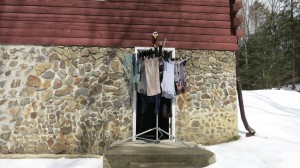 connection. We have a fancy dryer but I dry my clothes with two lines I have in the basement and a portable expandable clothesline (left) I can use outside until bug season, at which point it’s assembled in an unused bedroom that fulfills my long-held desire to have a Zen room. By Zen, I don’t mean “minimalist and tastefully decorated”; By Zen I mean “empty.” I always told myself the moment I could line-dry all my clothes, I would. I also prefer sweeping to vacuuming, using garden sheers to a lawn trimmer, using a manual lawn mower to a power or riding mower, and shoveling our fifty-yard inclined driveway by hand instead of using a snow blower. No electricity consumption, no annoying and loud noise and taking my time instead of rushing. (I like listening to music but I’ve probably worn headphones as I was out walking no more than ten times total in my life. I like knowing what’s going on around me.) I view all those home maintenance functions as exercise more than I see them as work and the manual lawn/garden tools allow me to become better acquainted with the property than using their powered equivalents. I’ve always played with the idea of fish farming or something similar in order to be self-sufficient and for the bartering system we’ll be returning to. Over the last thirty years, I’ve often told anyone who would listen we should go back to being an agrarian society. Too late to do it voluntarily now.
connection. We have a fancy dryer but I dry my clothes with two lines I have in the basement and a portable expandable clothesline (left) I can use outside until bug season, at which point it’s assembled in an unused bedroom that fulfills my long-held desire to have a Zen room. By Zen, I don’t mean “minimalist and tastefully decorated”; By Zen I mean “empty.” I always told myself the moment I could line-dry all my clothes, I would. I also prefer sweeping to vacuuming, using garden sheers to a lawn trimmer, using a manual lawn mower to a power or riding mower, and shoveling our fifty-yard inclined driveway by hand instead of using a snow blower. No electricity consumption, no annoying and loud noise and taking my time instead of rushing. (I like listening to music but I’ve probably worn headphones as I was out walking no more than ten times total in my life. I like knowing what’s going on around me.) I view all those home maintenance functions as exercise more than I see them as work and the manual lawn/garden tools allow me to become better acquainted with the property than using their powered equivalents. I’ve always played with the idea of fish farming or something similar in order to be self-sufficient and for the bartering system we’ll be returning to. Over the last thirty years, I’ve often told anyone who would listen we should go back to being an agrarian society. Too late to do it voluntarily now.
![]() Another reason I thought about leaving the gloss of Silicon Valley was that the emphasis on technology seemed to be going in the wrong direction (producing technology to make people progressively more impatient and physically and mentally lazy) and doing so too quickly. When I left the software industry, I did so without regrets. When I left, there was a pervading desperation to “find the hot new startup” that I had no interest in being part of. The extent of my effort in that search was when I was recruited by an innovative company that seemed to have a product that would revolutionize programming. It was a tool that was supposed to check each day’s programming for flaws in things like logic and syntax, which would eliminate the need for programmers go through the tedious line-by-line process of debugging when they’d completed writing a program. With the tool, once the program was completed, it was clean and ready to go. Since it seemed like a sensible, helpful product there was a legitimate need for, I joined the company. I was there for six enjoyable months before relocating to LA for personal reasons that were not foreseeable when I started the new job. The company was sold shortly after that and the founder of that company, Reed Hastings, went on to start Netflix. I left Silicon Valley at the same time the internet bubble was getting out of control and its later burst/crash/implosion was easily foreseeable because all the frenzied activity was based on speculation, and desperate and blinding speculation at that. It just struck me as very irrational, like all feeding frenzies are. That was 1995. I was glad to get out when I did, although, as a fan and customer of Netflix’s DVD rental and online streaming services, that’s one company I might have considered sticking it out with given the opportunity. As it turns out, my film industry experiences confirmed my exit from software was the right move at the time.
Another reason I thought about leaving the gloss of Silicon Valley was that the emphasis on technology seemed to be going in the wrong direction (producing technology to make people progressively more impatient and physically and mentally lazy) and doing so too quickly. When I left the software industry, I did so without regrets. When I left, there was a pervading desperation to “find the hot new startup” that I had no interest in being part of. The extent of my effort in that search was when I was recruited by an innovative company that seemed to have a product that would revolutionize programming. It was a tool that was supposed to check each day’s programming for flaws in things like logic and syntax, which would eliminate the need for programmers go through the tedious line-by-line process of debugging when they’d completed writing a program. With the tool, once the program was completed, it was clean and ready to go. Since it seemed like a sensible, helpful product there was a legitimate need for, I joined the company. I was there for six enjoyable months before relocating to LA for personal reasons that were not foreseeable when I started the new job. The company was sold shortly after that and the founder of that company, Reed Hastings, went on to start Netflix. I left Silicon Valley at the same time the internet bubble was getting out of control and its later burst/crash/implosion was easily foreseeable because all the frenzied activity was based on speculation, and desperate and blinding speculation at that. It just struck me as very irrational, like all feeding frenzies are. That was 1995. I was glad to get out when I did, although, as a fan and customer of Netflix’s DVD rental and online streaming services, that’s one company I might have considered sticking it out with given the opportunity. As it turns out, my film industry experiences confirmed my exit from software was the right move at the time.
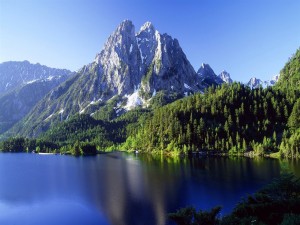 The Montana/chickens idea was more than twenty years ago and I was already thinking about moving to a northern and remote place and detaching myself from a dependence on electronics to some vague extent. I love north and remote and now realize I want more of both. I’m now thinking – just playing with the thought and not making proclamations like Alec Baldwin does (and never follows up on) – of getting rid of computers, TVs and internet access when/if I make that move. I’m not planning on making any changes soon and may change my mind and not alter the electronics part of my lifestyle at all but I’ve spent the last twenty years giving it thought. This unplanned eight-day test/abstinence was a fascinating, enlightening and, again, liberating experiment. When I started abstaining (on a Sunday), I had no time period in mind and thought I’d maybe just take the day off then go back on that night. As each day went on, the projected return date got pushed back. At first I said I’d go back online Tuesday. Then it became Wednesday. Then on Wednesday I decided to try it for a full week and go back the next Sunday. I ended up going back online the following Monday, which I did reluctantly. And begrudgingly.
The Montana/chickens idea was more than twenty years ago and I was already thinking about moving to a northern and remote place and detaching myself from a dependence on electronics to some vague extent. I love north and remote and now realize I want more of both. I’m now thinking – just playing with the thought and not making proclamations like Alec Baldwin does (and never follows up on) – of getting rid of computers, TVs and internet access when/if I make that move. I’m not planning on making any changes soon and may change my mind and not alter the electronics part of my lifestyle at all but I’ve spent the last twenty years giving it thought. This unplanned eight-day test/abstinence was a fascinating, enlightening and, again, liberating experiment. When I started abstaining (on a Sunday), I had no time period in mind and thought I’d maybe just take the day off then go back on that night. As each day went on, the projected return date got pushed back. At first I said I’d go back online Tuesday. Then it became Wednesday. Then on Wednesday I decided to try it for a full week and go back the next Sunday. I ended up going back online the following Monday, which I did reluctantly. And begrudgingly.
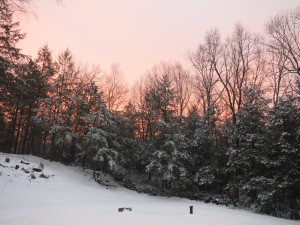 For the first several days of the abstinence, I found myself constantly and predictably gravitating toward the laptop to check on the news, add something to my Amazon shopping cart, check my Netflix DVD and streaming queues or research a question. I always have questions. (One thing I’m not at all inquisitive about is what’s going on in other people’s lives. I just don’t care, a life-simplifying perspective I recommend highly.) I smiled every time I caught myself and didn’t follow through because each occurrence made me realize how strongly conditioned I am to using the computer/internet and realized how compulsive – however functional – the behavior was. What made it easy was the cushion of knowing I’d have it back at the end of my self-imposed exile and I could go back on any time I wanted if I had to, which is very different from not having it available at all. It was far more liberating than it was difficult. For one thing, it was more time I spent by or, more accurately, with myself and without distractions. When I’m alone – which I’ve been for about 90% of the time since my January 2013 move to the Hudson Valley and during the most brutal part of the winter – I’m not lonely; it’s like being here with another me or even several versions of me. Far from being depressed from loneliness, I thrived in a way I didn’t expect. I didn’t know what to expect but being depressed wasn’t on the list of expectations. There was too much to do because of the move and that’s what I focused on, along with exploring the immediate area and getting more fit. When I’m alone I don’t have to make any conversational concessions and my thinking is completely unencumbered by people or things that distract, disrupt, misinterpret, and undermine it.
For the first several days of the abstinence, I found myself constantly and predictably gravitating toward the laptop to check on the news, add something to my Amazon shopping cart, check my Netflix DVD and streaming queues or research a question. I always have questions. (One thing I’m not at all inquisitive about is what’s going on in other people’s lives. I just don’t care, a life-simplifying perspective I recommend highly.) I smiled every time I caught myself and didn’t follow through because each occurrence made me realize how strongly conditioned I am to using the computer/internet and realized how compulsive – however functional – the behavior was. What made it easy was the cushion of knowing I’d have it back at the end of my self-imposed exile and I could go back on any time I wanted if I had to, which is very different from not having it available at all. It was far more liberating than it was difficult. For one thing, it was more time I spent by or, more accurately, with myself and without distractions. When I’m alone – which I’ve been for about 90% of the time since my January 2013 move to the Hudson Valley and during the most brutal part of the winter – I’m not lonely; it’s like being here with another me or even several versions of me. Far from being depressed from loneliness, I thrived in a way I didn’t expect. I didn’t know what to expect but being depressed wasn’t on the list of expectations. There was too much to do because of the move and that’s what I focused on, along with exploring the immediate area and getting more fit. When I’m alone I don’t have to make any conversational concessions and my thinking is completely unencumbered by people or things that distract, disrupt, misinterpret, and undermine it.
 Every day of the internet abstinence was better than the previous and it was an unexpected high I was not interested in coming down from. It was like – and I have never, ever thought in these terms before – my soul was in the process of healing. If someone would have used that phrase in a conversation before, I’d tell them to get away from me. Actually, I’d still do that. Here’s a good analogy: When you take a vacation from work, especially if you travel, you can’t get work out of your mind for the first few days but by the fourth or fifth day you’re finally able to detach yourself from your job and regular routine. You remember what it’s like to be you, something a busy adult schedule doesn’t allow for but it’s not something you think about because you’re too busy worrying about and focusing on the things you worry about and focus on. When you’re on vacation, assuming you’re doing it correctly, you’re not only exploring what’s around you (regardless of what you’re doing), you get the rare and valuable opportunity to re-explore yourself, which is an almost child-like state. That’s what my detachment from the computers/internet did for me. Combine that with the fact I was also by myself except for when I ran errands, visited my neighbors and watched “Man of Steel” and you can see my self-exploration was done at an accelerated pace.
Every day of the internet abstinence was better than the previous and it was an unexpected high I was not interested in coming down from. It was like – and I have never, ever thought in these terms before – my soul was in the process of healing. If someone would have used that phrase in a conversation before, I’d tell them to get away from me. Actually, I’d still do that. Here’s a good analogy: When you take a vacation from work, especially if you travel, you can’t get work out of your mind for the first few days but by the fourth or fifth day you’re finally able to detach yourself from your job and regular routine. You remember what it’s like to be you, something a busy adult schedule doesn’t allow for but it’s not something you think about because you’re too busy worrying about and focusing on the things you worry about and focus on. When you’re on vacation, assuming you’re doing it correctly, you’re not only exploring what’s around you (regardless of what you’re doing), you get the rare and valuable opportunity to re-explore yourself, which is an almost child-like state. That’s what my detachment from the computers/internet did for me. Combine that with the fact I was also by myself except for when I ran errands, visited my neighbors and watched “Man of Steel” and you can see my self-exploration was done at an accelerated pace.
 One unexpected revelation was that, historically, I’ve always strongly disliked writing out by hand anything longer than a five-word note and writing of any length gave me instant writer’s cramp. With the computer off, I was forced to write by hand instead of type. I found a blank 5×8 lined writing pad and wrote down any notes and thoughts I had. I just checked and only one page is now blank and all but a few are wall-to-wall with my writing, and I write in surprisingly small print, which I’d estimate to be 11-point font size. This article was written almost in its entirety by hand during that abstinence. The same with most of the other articles I’ve posted up to this point. Even writing by hand was therapeutic and relaxing, attributable to its unhurried pace and lack of electronic involvement. Everywhere I turned that wasn’t a computer or bright screen was a pleasure during the duration of the abstinence and my mind never stopped moving at a healthy pace and in a positive way. The computer and its uses are a disruption from my thinking more than they are a source of stimulating it in a healthy way.
One unexpected revelation was that, historically, I’ve always strongly disliked writing out by hand anything longer than a five-word note and writing of any length gave me instant writer’s cramp. With the computer off, I was forced to write by hand instead of type. I found a blank 5×8 lined writing pad and wrote down any notes and thoughts I had. I just checked and only one page is now blank and all but a few are wall-to-wall with my writing, and I write in surprisingly small print, which I’d estimate to be 11-point font size. This article was written almost in its entirety by hand during that abstinence. The same with most of the other articles I’ve posted up to this point. Even writing by hand was therapeutic and relaxing, attributable to its unhurried pace and lack of electronic involvement. Everywhere I turned that wasn’t a computer or bright screen was a pleasure during the duration of the abstinence and my mind never stopped moving at a healthy pace and in a positive way. The computer and its uses are a disruption from my thinking more than they are a source of stimulating it in a healthy way.
 From another perspective, it felt good not looking at LED or LCD screens, which I’ve always felt were too bright and on which I spend a disproportionate amount of time. For four years I had two monitors at the office then I’d go home to watch a bigger one for the rest of the evening. I’ve now gotten into the habit of watching the news during the day – if I have the TV on at all – on an iPod dock with a 7” screen through its auxiliary input as opposed to using my 40” LCD TV and surround-sound receiver (I did, however, use the receiver to listen to music, whose enjoyment was enhanced by my internet exile), both of which are excessive during the day for me now. I don’t actually watch the news anyway and just listen to it while I do other things. I still have the option of looking at the picture if a news story gets my interest without having to burn out my corneas looking at an HD screen in the process. Nobody has to tell me viewing on HD screens is bad for my eyes, I feel it and seem to be getting progressively more sensitive to it as time goes on. I’ve never watched this little TV in my life. One of the reasons I held off a long time before getting an HD TV was that it seemed intuitive that once you had HD, you’d never go back. It turns out that’s not the case for me, at least not at this point. Judge your case for yourself. In the evening, any video viewing was done on my 50-lumen projector in the basement with a good two-speaker-plus-subwoofer setup. The projector’s picture is like the best pre-HD television picture but blown up to a diagonal 120 inches and the projector uses much less energy than the backlit 40” LCD HD TV. During the winter, I’d sometimes warm my hands by putting them near and on the LCD screen. Things that produce heat use more energy. You think I’m kidding. Get close and check out how much heat they emit.
From another perspective, it felt good not looking at LED or LCD screens, which I’ve always felt were too bright and on which I spend a disproportionate amount of time. For four years I had two monitors at the office then I’d go home to watch a bigger one for the rest of the evening. I’ve now gotten into the habit of watching the news during the day – if I have the TV on at all – on an iPod dock with a 7” screen through its auxiliary input as opposed to using my 40” LCD TV and surround-sound receiver (I did, however, use the receiver to listen to music, whose enjoyment was enhanced by my internet exile), both of which are excessive during the day for me now. I don’t actually watch the news anyway and just listen to it while I do other things. I still have the option of looking at the picture if a news story gets my interest without having to burn out my corneas looking at an HD screen in the process. Nobody has to tell me viewing on HD screens is bad for my eyes, I feel it and seem to be getting progressively more sensitive to it as time goes on. I’ve never watched this little TV in my life. One of the reasons I held off a long time before getting an HD TV was that it seemed intuitive that once you had HD, you’d never go back. It turns out that’s not the case for me, at least not at this point. Judge your case for yourself. In the evening, any video viewing was done on my 50-lumen projector in the basement with a good two-speaker-plus-subwoofer setup. The projector’s picture is like the best pre-HD television picture but blown up to a diagonal 120 inches and the projector uses much less energy than the backlit 40” LCD HD TV. During the winter, I’d sometimes warm my hands by putting them near and on the LCD screen. Things that produce heat use more energy. You think I’m kidding. Get close and check out how much heat they emit.
I don’t have or aspire to own a tablet, whose necessity is even more artificial than that of the gadgets I exiled for those eight days. Think of it in these terms: prior generations not only didn’t need a tablet and, until they came out, neither did we or, specifically, current tablet owners. Tablets are another indicator of our increasing lack of patience and they’re the current absurd criterion by which weak people use to validate themselves and judge others and are nothing more than security blankets or even pacifiers. (That thinking doesn’t apply to people who are forced to use them for work.) What’s the rush? I can wait until I get home to my laptop. (One new technology that seems to be right around the corner is Google Glass. I want that guy dead. Talk about distorted and self-important. I saw a headline saying he felt “naked” without it. See a shrink, loony. Actually, common sense is kicking in and there’s a resounding resistance to the technology so there’s hope yet.) Pacifiers are a good analogy because parents now think, by exposing their kids to tablets the moment they can acknowledge objects visually and attain any dexterity, they’re making their kids smart. Bad move and exactly the opposite is happening. They’re already conditioning kids to react and respond instead of think and they’re only learning to become brain-lazy and dependent on the tablets, which only prepare the children for the next generation of unnecessary and brain/thought-deadening communication devices. In other words, they’re learning to not think.
Take my idea of previous generations who didn’t need tablets back to the Old West and get used to the idea of that period and it’s non-electronic implications because, when the internet crashes for good, we’ll be back to what it was like back then. And it will happen because it can and because there are too many insane and bitter nerds out there who grew up only having computers and similarly dysfunctional geeks as friends. These people were intimidated out of giving life a fair shake and irresponsibly and delusionally blame their problems and inadequacies on the world, creating their own distorted reality, just like that NSA leak jerk did but to a worse degree. Those are the people working on taking down the internet.
The resulting loss of technology will put us back to a place similar to how things were in the Old West, but it will be much, much worse. This time we would know and have grown dependent on what we lost and would have to deal with the currently-indefinable residual carnage. And “lost” is exactly where we’ll be and – I hate to say this because we’ll all be taken down—which is why I bemoan the loss of things like Borders Books (Barnes & Noble was likely to have absorbed them anyway but you know what I mean.), the print version of Newsweek and the biggest and most foreseeable casualty of the direction we’re heading, public libraries. Once a well-utilized treasure trove of diverse resources, information and entertainment (which they still are), their usefulness and value lessens by the day as they are usurped by an ever-growing number of alternatives. Those are just examples and not an all-inclusive list by any means. The final internet crash will likely happen long after the last library is closed because/and that’s when it will have its most destructive and irreversible impact. It will happen when book pages are so old they’ll disintegrate when you touch them. That’s, of course, assuming people recognize what books are. The same thing with other resources and sources of information. Current resource
media that requires a specific drive like CDs and DVDs will have no value and be all but a memory by then, the way LP’s (still available in a limited capacity), audio cassette tapes, and floppy discs and are now. If any of those drives are around after the crash, assuming we’ll have electricity, there will be far too few of them to accommodate the overwhelming and desperate (hold on to that word for the duration of this writing) masses that will be (insert the adverb form of that word here) clamoring for. The post-apocalyptic world and scenes from the movies “I Am Legend” and “The Road” (Charlize Theron’s final scene will stick with me forever) are nothing compared to what’s actually going to happen. OK, those movies are sort of like what’s going to happen. Those movies take place after apocalypses. Whoever’s around while it’s occurring will experience what happens DURING an apocalypse. Some of my examples are admittedly exaggerations (I think) but you get the point. I was given a very slight but still perspective-impacting feel for this scenario when I was in Manhattan when (and the three days after) Sandy hit. I was at a hotel on 25th Street near 7th Avenue (four blocks from where I used to live) looking out my window toward downtown when I saw the sky-filling flash of light from the explosion that took out the power and when everything immediately went black. 25th Street was a dividing line of the power loss and I was on the wrong side of that line. If anything, things got more interesting. Most importantly, I was with the one person I would have needed to contact had one of us not gone on that trip to New York. That feeling of relief made me very comfortable.
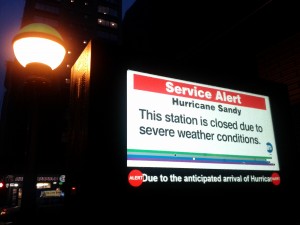
7th Ave and 23rd, Street, Oct 29, 5:56pm. This was the last picture I took that day. Sandy hit approximately three hours later.
I wasn’t afraid and didn’t panic, mostly because it does no good and I’m practical more than anything. As an example of my practicality, when I was 17, I called the fire department and said, “Would you please send a fire truck to this address? Our backyard fence is on fire.” The woman who responded said, “It doesn’t sound like you have a fire”, because I spoke calmly. I said, “What good would yelling do?” She responded, “I guess you’re right, it’s just that nobody ever calls to report a fire sounding the way you do.” I said, “Our fence is on fire. Please send a truck”, and gave her my address again and the trucks arrived immediately. My mom also faulted me for not being more dramatic, urgent and emotional on the call. If I were a dispatcher, I’d much rather talk to a calm person than a frantic one. I’d still get the point.
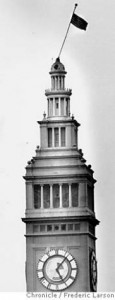
A picture of the San Francisco Ferry Building showing the time the clocked stopped during the 1989 Loma Prieta earthquake. I was in my office two blocks away when the quake hit.
We both worked in San Francisco when the October 1989 Loma Prieta earthquake hit and again were able to connect quickly since our offices were near each other so this wasn’t our first time at the rodeo (I’ve always wanted to plagiarise that line). Again, our stress was minimized by our ability to get through it together and we didn’t worry about getting home to Berkeley (the Bay Bridge had collapsed) and knew it was just a matter of time. We drove to Diamond Heights to spend the night at a friend’s house but didn’t sleep much. On the drive and looking out the windows at his home (which had a great view of San Francisco), the power outage, sirens and fires made us feel like we were in a war zone. I was awoken by a tremor around 3:30am and woke up my buddy (who, incidentally, watched the second World Trade Center tower collapse from his balcony) and told him we had to leave right then because the traffic – we had to take the Golden Gate Bridge then the Richmond-San Rafael Bridge to get home – would be at its most minimal. The streets that led to the Golden Gate Bridge (19th Street and Lombard Street) were like parking lots as far as you could see when we approached them in our efforts go get home before resigning ourselves to spending the night in The City. I guess it took about 45 minutes to get home and I don’t think we saw ten cars during that entire drive. I was a bit concerned for the cats and my 55-gallon aquarium and it was a relief when we got home and saw no evidence of an earthquake.
Back to Sandy. Quite the opposite of panicking, I was stimulated at how this situation would test our patience, resourcefulness and any other skills required to progress through this occurrence on the way to our ultimate goal of returning home which, again and not knowing at the time, would be three days later. I like being tested. Since the power was out at our hotel, my buddy and I spent the next day checking to see any reasonably-priced rooms were available at hotels that had not lost electricity. We struck out like Joseph and Mary on their inn pursuit since every hotel was either packed or understandably had jacked up their prices proportionate to the new demand, which was growing more (that word) by the hour, if not by the minute. They were filling up not just with incoming visitors and people like us whose hotels lost power but, most importantly, Manhattan residents whose homes were without power. Think about it; Manhattan is a very densely populated borough where the blocks can be almost as high as they are long. The rates were so high that our room without power didn’t seem bad at all. The hotel’s emergency power system was enough that the lobby and each floor’s elevator lobby had light. What I witnessed during Sandy’s Chelsea and, mostly, Midtown, aftermath was amazing and foreboding. We repeatedly walked by people huddled together in front of Starbucks stores for the Wi-Fi (those stores that had electricity, anyway). We walked by groups of people sitting or on in their hands and knees by lamp poles that had a/c power outlets at their bases, recharging their smart phones, tablets and laptops.
There were more people in line waiting to do the same and some people bought power strips to accommodate as many chargers as possible. As we walked past these groups, who generally seemed in good spirits even though the overall scenario seemed (that word), I wondered what the priority in response to a similar event would have been before the advent of laptops, smart phones and tablets. Here’s how much it bothered me seeing those things happen: I didn’t take one picture of those instances, and I take pictures of everything, including my restaurant meals. Speaking of which, if anything, the unavailability of restaurants with power or that weren’t packed played into our favor since we eat too much, anyway. Aren’t times like this – when food is not available – the reason our bodies store fat? That’s making lemonade out of rocks. (As it turns out, we only missed one meal.) In a seventy-two hour period we easily spent at least twenty hours in the massive multi-level lobby of the W Hotel at 49th and Lexington to charge our (three) smart phones and my buddy’s Macbook Air. This was just an inconvenience for us and we were never worried, especially considering how badly I felt for the people who actually lived in the areas that lost power. It was in my inability to help people who needed help that I felt the worst. It was bad and going to get worse for them. I had the comfort of knowing I’d be home soon once the airports opened, it was just a matter of time.
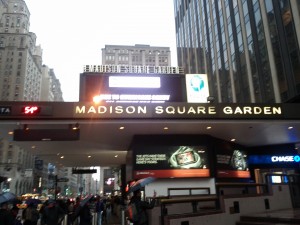
Madison Square Garden the day after Sandy. The first line of the marquis reads, ‘DUE TO HURRICANE SANDY.”
One particularly poignant moment occurred when we were in the lobby of our hotel one night, talking to the clerks – they appreciated our patience because other lacking-in-perspective hotel guests actually complained about things that were power-outage related – and a guy walked in and very timidly asked if he could use the hotel’s Wi-Fi because he lived in the building next door and found the hotel’s Wi-Fi signal on his phone. The clerks explained they actually didn’t have internet access because of the power outage and the guy, clearly deflated and defeated, resigned himself to face that reality and left the hotel. That simple interaction was powerful to the point I wish I wasn’t there to see it. I don’t find other people’s misery to be remotely entertaining, which is a trait I find loathsome. It wasn’t a dramatic confrontation but it didn’t have to be to have an impact. I felt terrible for him. Actually, more than terrible because of my inability to help him. And he really needed help. You had to be there.
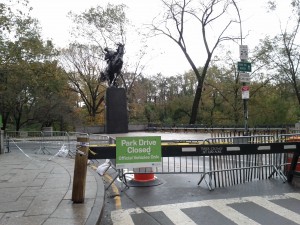
The day after Sandy. Central Park had been blocked off in preparation for the NY Marathon, which was cancelled.
I could go on but I’ll stop here. You saw and read the news about Sandy for months afterward and we’re still hearing about the recovery. Just imagine a similar event, but more debilitating and on a world-wide scale. I’ve given you examples of why and how – by planning on simplifying my life and minimizing my dependence on technology at a yet-to-be-determined time and to a yet-to-be-determined extent – I’m also preparing myself for the inevitable permanent crash of the internet and the end of the pervading lifestyle at the time of its occurrence. My thinking isn’t fear-based at all; it just seems like the smart and better thing to do for me. I didn’t take the internet into account when I first started thinking about minimizing but the internet makes my tentative plans all the more sensible. The big crash of the internet will make the unspeakably horrible tragedy that occurred in Manhattan around Labor Day of 2001, an event that still conjures incomprehensible disbelief, seem like a much less significant event by comparison. I never, ever trivialize that terrible day, its destruction and especially not its victims or their survivors and I’m not trivializing it or them now. For those people who think, “if it could happen, it would have happened by now”, think about it; if it happened now it would be a major inconvenience but we could recover and do so relatively quickly. The people working on taking down the internet are biding their time. As our dependence on the internet – which, in itself, has no physical presence – increases, the more traditional alternatives for the things the internet provides will become progressively less available as they become obsolete in the wake of the internet, whose potential we still may not fully understand because it seems so limitless. The farther into the future the crash occurs, the more damaging and irreversible it will be.
The same people who currently live off the land and are completely detached from our values, gadgets, and dependencies, people we refer to as “third world” and “primitive”, and will be mostly unaffected and are the ones who will have the last laugh. Actually, they won’t know to laugh at something like that. That sort of thinking is as foreign to them as theirs is to us. They live a lifestyle dictated by their connection to and relationship with their natural surroundings and an uncomplicated emphasis on spirituality. Real spirituality in our way of life is deteriorating at such a meteoric pace that it makes global warming/climate change and the destruction of the Amazon rain forests seem like they’re not happening at all.
We’re setting ourselves up for this so perfectly it’s not funny. I’m not trying to induce fear or paranoia; I’m trying to induce thought, reason, grounded values and self-preservation, especially spiritual self-preservation. Take a huge step back and look at the “progress” of technology and think about what really was and wasn’t necessary in leading us to this point. For me, communication technology peaked with the cell phone and email. Anything beyond that is overkill, ultimately unnecessary and just indicative of our ever-decreasing ability to be patient and comfortable in our skin and our ever-increasing need to validate ourselves in the most absurd ways, which results in one artificially-induced dependence/addiction after another. If souls had a physical presence, the skies would be increasingly full of their ascensions because they’re leaving us more and more quickly, but we’re too busy smart-phoning, tableting, texting, Facebooking, Tweeting, Pinstering, and whatever-the-gadget-and-next-social network-thing-is-around-the-corner-ing to notice or care.
Big trouble is looming on the horizon and you have to be inattentive, naïve and in denial to not think so. It may happen in five years, it may happen in twenty. Technology and the obsolescence rate of things we’ll miss are moving at such an increasingly rapid pace it’s impossible to gauge anything at this point. Still, and as I say repeatedly, I like when I’m proven wrong, especially there are forward thinking companies and talented people working hard to keep the internet safe and stable.
DPW
October 3, 2013
The pictures without captions were taken on our property this year, with the exception of the Montana scenery (which I got off the internet), the map of Silicon Valley and the picture of Oracle Corp’s headquarters.
Added February 27, 2015
Case in point, half of Arizona lost internet, phones, and cell phone service because vandals cut through a fiber optic cable.
The original title of this article was “How I’m Preparing for the Inevitable Permanent Crash of the Internet” but it was too doomsday-ish.
Added April 7, 2020 – I changed the very last sentences of this article because they didn’t reflect the way I think. Time and knowledge helps us evolve. Besides, and consistent with the comment just above this addition, I could not in good spirit end the article on such a negative note. The article really was more about how good it felt to detach from the internet for a week. In knowing I could do it, I gained an appreciation for the internet and now focus more on the good than the bad, and the amount of good the internet has to offer is limitless.

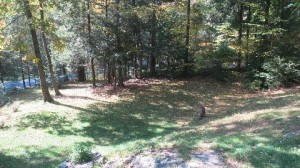

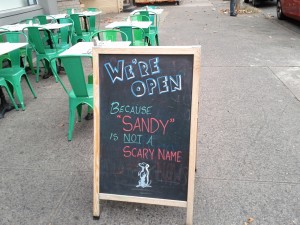
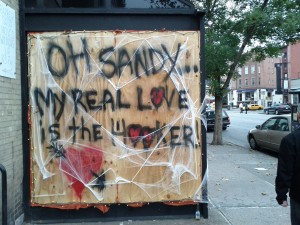
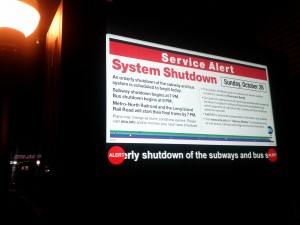
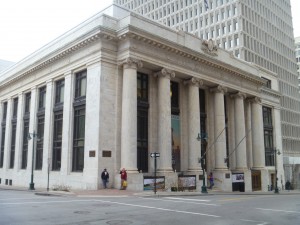
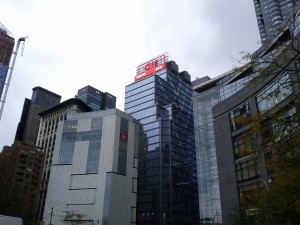
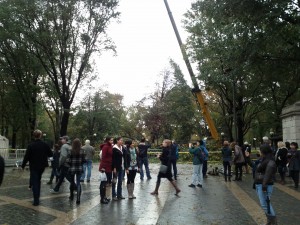
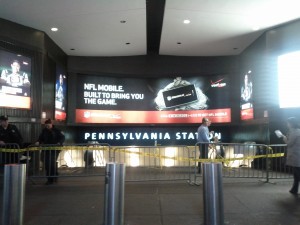

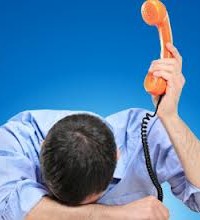
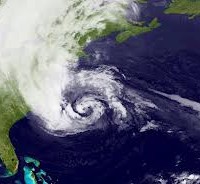
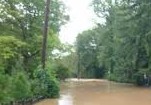



Great Stuff Dan! It was a little long, but I enjoyed it. I think everyone needs to take a break from all the electronics. I go salmon fishing and enjoy being on the river where the only noise i can hear is the water flowing around my body as I wade casting my line. Too much of anything is bad. So, when I get back to the computer, it is usually refreshing, but if it was to all crash, there are still other ways to entertain yourself. Your Sandy story was very interesting. Thanks for sharing.
As my forearm is hurting from touch pads and the mouse and sneaking in quick email or news flashes from the cell instead of sleeping, I so often yearn for saying “didn’t get the memo”. Life was more fun running through the woods or fields growing up, always outside, and only a handful of television stations available.
Dan, I don’t know where to start. Love how you connect the dots between disasters —earthquakes on the west coast, hurricanes on the east— and somehow leave us a trail of crumbs for our impending Armegeddon of the Internet. I would argue with you about libraries, though, which are proving they can thrive very well sans books. The parking lot to mine is eternally full after 9 A.M. And the college I teach at did away with all physical texts (sadly)the year before I arrived. Best line: Making lemonade out of rocks (paraphrase). Didn’t see it coming and I love when anyone turns a cliche on its side for another look! Oh yeah, and “our fence is on fire”. . . That anecdote was worth the price of admission alone (no exclamation point needed). . . .